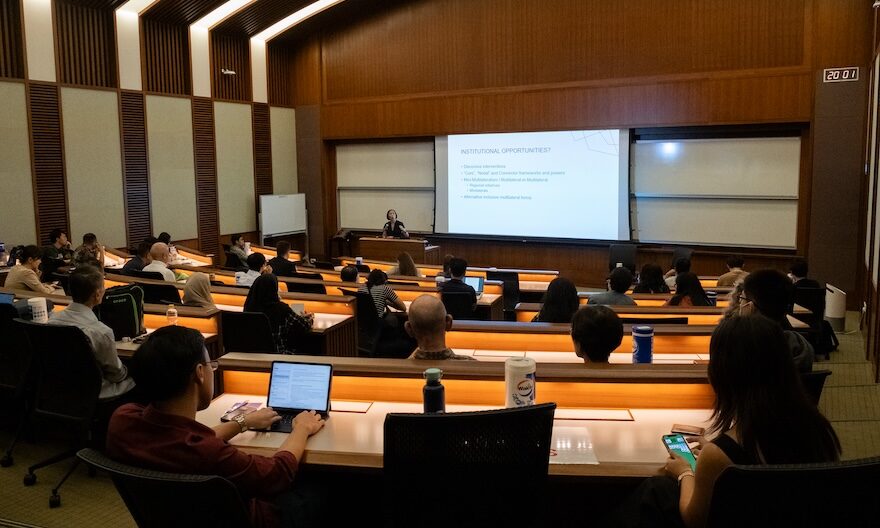Experts unpack the implications of China’s rise at Yale-NUS Geopolitics Series
 The speakers of the webinar ‘A New Era of Geopolitics: China’s Rise and the Global Order’. From left: Assistant Professor Chin-Hao Huang (Yale-NUS), Professor Kishore Mahbubani (Asia Research Institute, NUS), Professor Arne Westad (Yale), and Professor Chan Heng Chee (Yale-NUS Governing Board Member)
The speakers of the webinar ‘A New Era of Geopolitics: China’s Rise and the Global Order’. From left: Assistant Professor Chin-Hao Huang (Yale-NUS), Professor Kishore Mahbubani (Asia Research Institute, NUS), Professor Arne Westad (Yale), and Professor Chan Heng Chee (Yale-NUS Governing Board Member)
On 22 September 2021, Yale-NUS College hosted its first webinar of the new Geopolitics Series, ‘A New Era of Geopolitics: China’s Rise and the Global Order’. Supported by the Tan Chin Tuan Foundation, the webinar was organised to discuss the implications of China’s rise and the new global order on the region and beyond. Vice President of Engagement and Senior Lecturer of Social Sciences (Sociology and Political Science) Trisha Craig noted that with China set to become the world’s largest economy by the end of the decade, its rise brings forth “a new era of great power competition”, and “there is no more important geopolitical relationship than that between China and the United States (US)”.
The webinar was attended by global experts and scholars from Yale-NUS College, Yale University, the National University of Singapore (NUS), and other institutions as well as members of the public.
Director of NUS East Asian Institute Bert Hofman, who was the moderator of the panel, kicked off the event with a timely quote from The Economist, “You can see the tectonic plates of geopolitics shift in front of your eyes.” This sentiment was echoed in President of Yale-NUS Professor Tan Tai Young’s welcome remarks that now more than ever, we are faced with pressing global issues like the pandemic and climate change, and these critical matters require coordinated, cross-state solutions. He emphasised the need to understand the implications of China’s rise, especially when there is an increased demand for global coordination to address urgent problems.
 A screen capture of the panel engaged in discussion.
A screen capture of the panel engaged in discussion.
Following the format of a fireside chat, the panellists debated over the nature of China’s rise and interactions with other countries. Professor Kishore Mahbubani, Distinguished Fellow at the Asia Research Institute, elaborated on China’s relatively peaceful rise, in comparison to the other global power’s violent histories, and emerging success based on global order. However, he noted that despite China’s success, “something very strange is happening in the world”; where instead of welcoming China, the West has been provoking and critiquing China. The other panellists, however, argued that China has not been peaceful but rather violent in its foreign affairs, citing the South China Sea conflict and its relations with Japan, Korea, and Taiwan.
On China’s meteoric rise over the last few decades, Yale-NUS Governing Board member Ambassador Chan Heng Chee, Ambassador-at-Large with the Singapore Foreign Ministry and Professor at the Lee Kuan Yew Centre for Innovative Cities of Singapore University of Technology and Design, offered a personal anecdote from an international meeting she attended in 1999, the turning point of the century. During the meeting, global leaders were asked what would be certain in the 21st century, and most answered that “America would be a hegemon”; no one apart from her talked about the importance of China. Decades later, her prediction has proven to be true.
Shifting the conversation to China’s foreign policy strategy and trajectory, Assistant Professor of Social Sciences (Political Science) Chin-Hao Huang emphasised the importance of understanding how China’s policy leads view themselves and their positions nationally and globally. It is by investigating further that we realise that the internal discussions reflect the external pressures and forces on China. “By analysing the policy from within, we can see where China is at and where it will be heading,” posited Asst Prof Huang
Elihu Professor of History at Yale University Arne Westad added that Southeast Asia is arguably the most dynamic region and is some of the most important countries outside of the superpower lands themselves; therefore, balancing and working cooperatively with the ASEAN countries will be vital for the US and China.
As the discussion wound down, Prof Westad expressed that the voices and points made by the panel are not ones heard typically, even in cities like New York or Washington DC. “Singapore is a unique location for such active dialogue as a friend to both the US and China; and Yale-NUS College is uniquely well-positioned to convene such dialogues with global ties to both the US and Asia.
Mr Hofman commented that the webinar only scratched the surface of global geopolitical relations, and the Geopolitics Series will continue with more webinars exploring relevant, complex and nuanced topics.
Click here to watch the video recording of “A New Era of Geopolitics: China’s Rise and the Global Order”.




